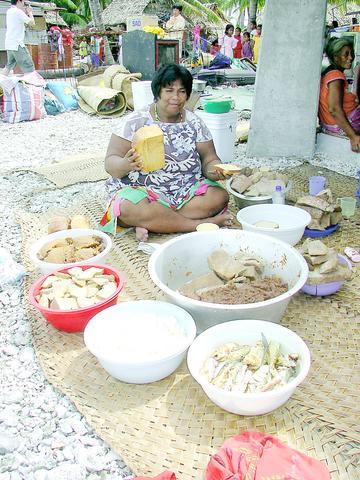President of Kiribati Anote Tong yesterday invited visiting Taiwanese Minister of Foreign Affairs Eugene Chien (簡又新) to his native Maiana, an island located east of the country's capital Tarawa, for a festival attended by local village chiefs and tribal leaders.
Residents on Maiana, which means "land east of Tarawa," welcomed Chien and his delegation, consisting of ministry officials and reporters, with traditional dancing, singing and local delicacies.
Still preserving their primitive lifestyles, residents on Maiana swarmed into the seaside conference venue where men and women dressed in coconut leaves and traditional costumes performed for Chien and his delegation.

PHOTO: MELODY CHEN, TAIPEI TIMES
According to the Taiwan embassy in Kiribati, around 2,000 people now lived on the island, who made their living chiefly by selling dry coconuts, sea cucumber and taro. Money remitted home by their overseas relatives is another key economic pillar of Maiana.
The journey from Tarawa to Maiana, however, marked one of the biggest difficulties Kiribati faces in attempting to develop the country's transportation.
While Tong, Chien and high-level officials flew from Tarawa to Maiana in a helicopter, the rest of the Taiwanese delegation left Tarawa at 4:30am to take a boat to Maiana.
The Kiribati government dispatched the country's only patrol boat, RKS Teanoai, to ferry the delegation to Maiana.
The sea journey lasted about two hours.
As the immediate sea surrounding Maiana is shallow, the patrol boat had to anchor several kilometers away from the island. On the choppy sea, the delegates climbed down from the patrol boat via rope ladders to smaller boats that would carry them to the island.
However, even the smaller boats were grounded before they reached the shore. The delegates had to disembark the boats to wade hundreds of meters in knee-deep waters to get to the shore.
Inspector Tataai Tataa, commanding officer of the Teanoai, said that although transportation problems have not hampered Kiribati's communication with other Pacific island nations, it has severely affected the rest of the world's interest in visiting Kiribati.
Having traveled to many countries, including Taiwan, the 31-year-old inspector's main job is to hunt foreign ships that conduct illegal fishing in Kiribati waters.
Foreign ships cannot fish in Kiribati waters without obtaining licenses issued by the Kiribati government. Kiribati's rich fishing grounds have drawn a lot of illegal fishing, said Tataa.
Although Kiribati owns great fishing resources, its government finds it difficult to develop the country's fishing industry. "Our problem is that we are very poor," said Tataa.
The Kiribati government is trying to procure more patrol boats to guard the country's waters, added Tataa. Australia, he said, has been helping Kiribati train marine officers. While Chien praised Tong's commitment to developing Kiribati, Tataa said most people in Kiribati believed their government has made a right decision to switch ties from Beijing to Taipei last November.
Taiwan and Kiribati's cooperation programs are vital to the livelihood of the Kiribati people. "Developing our country is our goal. People here think establishing ties with Taiwan is a good plan," Tataa said.
Also See Story:
Kiribati's chief justice lauds social security

The Ministry of the Interior (MOI) is to tighten rules for candidates running for public office, requiring them to declare that they do not hold a Chinese household registration or passport, and that they possess no other foreign citizenship. The requirement was set out in a draft amendment to the Enforcement Rules of the Public Officials Election and Recall Act (公職人員選舉罷免法 ) released by the ministry on Thursday. Under the proposal, candidates would need to make the declaration when submitting their registration forms, which would be published in the official election bulletin. The move follows the removal of several elected officials who were

The Republic of China (ROC) is celebrating its 114th Double Ten National Day today, featuring military parades and a variety of performances and speeches in front of the Presidential Office in Taipei. The Taiwan Taiko Association opened the celebrations with a 100-drummer performance, including young percussionists. As per tradition, an air force Mirage 2000 fighter jet flew over the Presidential Office as a part of the performance. The Honor Guards of the ROC and its marching band also heralded in a military parade. Students from Taichung's Shin Min High School then followed with a colorful performance using floral imagery to represent Taiwan's alternate name

COVETED PRIZE: The US president would be a peace prize laureate should he persuade Xi Jinping to abandon military aggression against Taiwan, William Lai said US President Donald Trump should get the Nobel Peace Prize should he be able to convince Chinese President Xi Jinping (習近平) to abandon the use of force against Taiwan, President William Lai (賴清德) told a conservative US radio show and podcast in an interview. The US is Taiwan’s most important international backer, despite the absence of formal ties, but since Trump took office earlier this year he has not announced any new arms sales to the nation. Trump could meet Xi at the APEC summit in South Korea on Oct. 31 and Nov. 1. Lai, speaking on The Clay Travis and Buck Sexton

A Chinese takeover of Taiwan would severely threaten the national security of the US, Japan, the Philippines and other nations, while global economic losses could reach US$10 trillion, National Security Council Deputy Secretary-General Lin Fei-fan (林飛帆) wrote in an article published yesterday in Foreign Affairs. “The future of Taiwan is not merely a regional concern; it is a test of whether the international order can withstand the pressure of authoritarian expansionism,” Lin wrote in the article titled “Taiwan’s Plan for Peace Through Strength — How Investments in Resilience Can Deter Beijing.” Chinese President Xi Jinping’s (習近平) intent to take Taiwan by force